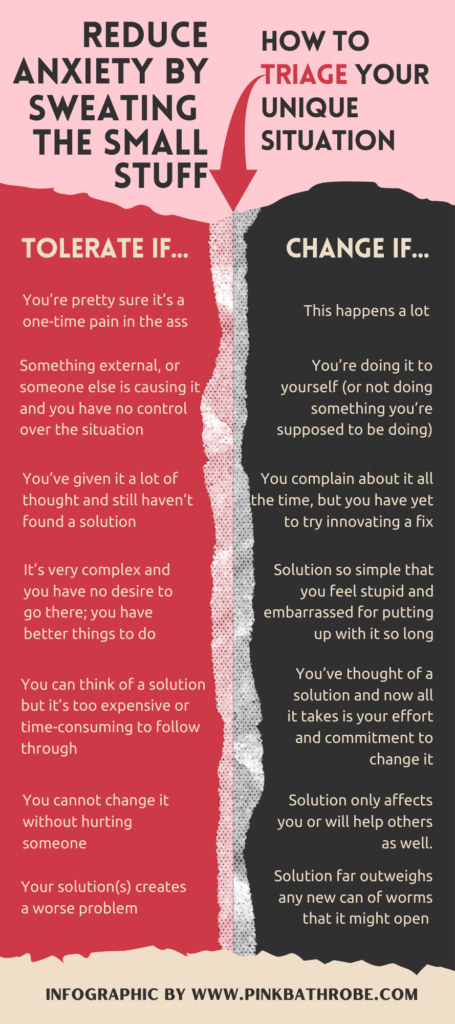It occurred to me, one day, that I let way too many little things give me low-key anxiety. Little things – aka SMALL STUFF – the stuff they tell us not to sweat.
Taking command of difficulties in our daily lives seems to include the concept of categorizing them as “big” or “small”. When we have big problems, we can reach out for help and it’s ok. To gripe about the small stuff, though, is considered petty or narrow-minded; so we’re taught to somehow ignore those things, especially when there are so many people suffering in this world.
The problem with this approach is that we all have a mental health and nobody can tell us how to feel. So instead the experts come in and say things like “relax, breathe, count to 10, sleep on it, do some exercise, have some good food. But what are they feeding us? A LOAD OF CRAP!!! That’s what.
We’re told to go easy on ourselves by letting things go and clearing our minds from the pesky little problems so that we can concentrate on the big and important ones. Is it in our best interests to make it a habit of pushing minor things out of our heads? Don’t these things often crop up again later? And wouldn’t the constant manufacture of tolerance be exhausting after a while?
I feel like I have enough people dismissing me and my opinions/thoughts/feelings in my life. Why would I do it to myself as well? The practice of avoiding any problems, whether big or small, is a slippery slope.
Tolerance as a Solution
Tolerance, a buzzword used a lot this millennium, is an important key for a better life. It is useful when dealing with workplace drama. It is essential on the road as a driver. It can save a new parent’s sanity. But one thing that tolerance should never govern – and that’s small (to medium) CHANGEABLE personal problems.
Why do that to yourself? Small problems often have easy fixes. It’s so simple and glaringly obvious – Instead of trying to be tolerant of a small problem, see if it has an easy or an attainable fix, then you’ll never have to tolerate it. If you just learn to let it go now, it’s just going to happen again and you’ll have to repeat the “letting go” process.

Troubleshooting the Small Stuff
When I say “reduce anxiety by sweating the small stuff”, I mean look closer at the ‘stuff’. It may seem counterintuitive at first, but try connecting with your petty problems. Take some mental notes on why they surface and find a way to take them out of the equation. Don’t bury them.
Example 1 – My Personal Example
When I cook, I rarely follow a recipe. I use what I have on hand and just throw things together. When making dishes like casseroles, soups, stir frys, and omelettes, it really is hard to go wrong as long as you know the basics. Since I cook this way, I often have things already cooking on the stove while I’m still choosing ingredients. One specific ingredient that always slips my mind until the last minute is garlic. I love garlic, but who wants to start peeling it when you already have pots and pans to stir and piles of compost to clear up. So I would call my husband in to do it for me until I found a better solution (not the jars, I don’t like those). I buy large packs of peeled garlic, mince it all in the food processor, flatten the entire batch on a cookie sheet, freeze it while it’s flat, and then cut it all into little cubes. This gives me several months’ worth of little frozen cubes in a bag in the freezer so that I can now include garlic in everything without a problem. I have learned to do this with several foods now (pesto, cured meats, vegetable puree) so that cooking and fixing meals is a breeze.
So – we probably can all agree that in the grand scheme of things, garlic is trivial and probably the dumbest thing to write an entire paragraph about. So instead, I’ll say the paragraph was about taking a mild frequent annoyance and turning it into a solution that evolved with secondary and tertiary benefits. In fact, I can think of so many ways to extend my simple solution and start a whole new cooking blog, all because I took the time to examine my annoyance up close.
Example 2 – A General Example
You’re driving with a friend and complaining that this particular route is always so slow and you’re sick of it. Your well-meaning friend says “hey don’t sweat the small stuff! It’s not a big deal! We’ll get there!”. This makes you think: “He’s right, why am I letting it bug me?” But instead of just letting it go and risking being upset about it later on when your mood is different again, you go home and that night, you carefully study Google Maps for a different route. You find a brilliant one and never have to complain again.

Significant Benefits of Fixing Insignificant Problems
By finding a new route you took the whole problem out of your day’s equation. A few things happen as a result:
You feel better in general;
You feel better about yourself for effectively solving a problem instead of just learning to tolerate it;
You’ve set yourself up for better future moods.
So maybe you only saved 5 minutes, and it takes 25 minutes to get there now instead of 30. The time saved is irrelevant – it’s the frustration of being bumper to bumper for one small stretch of road that always made you FEEL like it was actually DOUBLING your time. A small thing like that can be exaggerated in your head, and you might even be guilty of telling someone: “I can’t believe it took me twice as long to get here than it should have” When a small problem has that much control over your mood, take action for the sake of your mental health.
They turn you into a better overall problem-solver – A huge benefit of taking action for such small matters is that it can train you in solving bigger ones. Why save your problem-solving ability for bigger problems and ignore small ones? It’s not like you run out of problem-solving tokens. There is not a limited supply in your wallet or purse. (you check and “oh no, only got three left, gotta save ‘em for emergencies!”).
They feel good and they’re satisfying – My husband’s team at work calls them “quick wins” -when the issues are so small that instead of talking about them any longer, they just deal with them immediately. And this is great because I know how many meetings he has to sit through every week – meetings where they discuss projects ad nauseum and nobody gets anything done. Sometimes I think those quick wins are what gets him through his day.
Finding the Balance Between Changeable Problems and Ones You Should Tolerate
I’m not saying you should never learn to be tolerant. Of course tolerance is a great skill to have. The following infographic can help you identify your situation and decide which way to go:
Please don’t neglect your mental health because somebody told you not to sweat the small stuff! You can bet that they moan about little things as well, at least in their heads if not out loud. How they choose to deal with those things is their choice. They can choose to allow the same issues to come up repeatedly and be tolerant of them every time, or they can find a solution once and for all.
Your problems, however, are important to you and they’re NOT much ado about nothing. Neglecting anything that is important to you is neglecting your mental health.
I’ll take it one step further – if you’re not progressing then you’re regressing. That means that every day that you solve one of your problems, big or small, means you’re having a better life than you had the day before.
Happy troubleshooting!






4 Responses
Thank you for this! Gives me a lot to think about…
🙂
Thanks Ashley, I’m glad!
I strongly agree with the points made in the general example. Solving the smaller issues gives the mind a good practice and exercise to better approach larger issues making them seem less monumental, or in other words….stressful.
The term “quick wins” could not be more correct. The dopamine rush gained by solving any issue how big or small is unparalleled!! It becomes so rewarding and personally helps me try to be better and improve my mental health.
Great article! I look forward to reading more of your work. 🙂
Thanks for reading and your lovely comments!